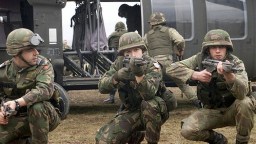Nancy Sherman
Philosopher and Author, “The Untold War”
Nancy Sherman is a Distinguished University Professor in the Philosophy Department of Georgetown University. She received her BA from Bryn Mawr College, her PhD from Harvard, and her MLitt from the University of Edinburgh. From 1997 to 1999 Sherman served as the first Distinguished Chair in Ethics at the US Naval Academy. She has taught at Yale, Johns Hopkins, and the University of Maryland, and has trained in psychoanalysis at the Washington Psychoanalytic Institute. Since 1995 she has consulted for the U.S. Armed Forces on issues of ethics, resilience, and post-traumatic stress, lecturing at the Uniformed Services University, Walter Reed Army Hospital, the National Defense University, and elsewhere. In October 2005, Sherman visited Guantanamo Bay Detention Center as part of an independent observer team, assessing the medical and mental health care of detainees. She has served on the Board of Directors for the Carnegie Council on Ethics and International Affairs.
Sherman's books include "Aristotle's Ethics: Critical Essays on the Classics," "Stoic Warriors: The Ancient Philosophy Behind the Military Mind," and her most recent, "The Untold War: Inside the Hearts, Minds, and Souls of Our Soldiers," published by W. W. Norton & Company in 2010.
Our “insidious” digital overconnectedness can pose a major challenge.
▸
2 min
—
with
What the philosopher can still teach us about grief versus stoicism and “the role of emotions in the good life.”
▸
4 min
—
with
The military ethicist believes Abu Ghraib represented an ethical breakdown “from the top down.” But have things changed under Obama?
▸
5 min
—
with
From the Iliad to Afghanistan, the field of military ethics has tried—not always successfully—to impose rules on the chaos of mass slaughter.
▸
9 min
—
with
We’re taking better psychological care of soldiers than we used to. But with deployments getting longer and longer, far more needs to be done.
▸
6 min
—
with
Maddening boredom. Utter numbness. Comradeship so intense that it threatens family ties. War’s worst psychological effects can be the ones you’d never expect.
▸
3 min
—
with
From mangled bodies to the twisted psychological world of Abu Ghraib, the stories Middle East veterans tell Nancy Sherman reveal a side of war not shown on TV.
▸
6 min
—
with
In some ways, the psychology of combat hasn’t changed since Troy. But modern wars have also brought their own unique traumas.
▸
4 min
—
with
The “Untold War” author first became interested in the psychology of combat by observing her father’s tight-lipped silence about World War II.
▸
4 min
—
with
A conversation with the Georgetown philosophy professor and author of “The Untold War.”
▸
42 min
—
with









